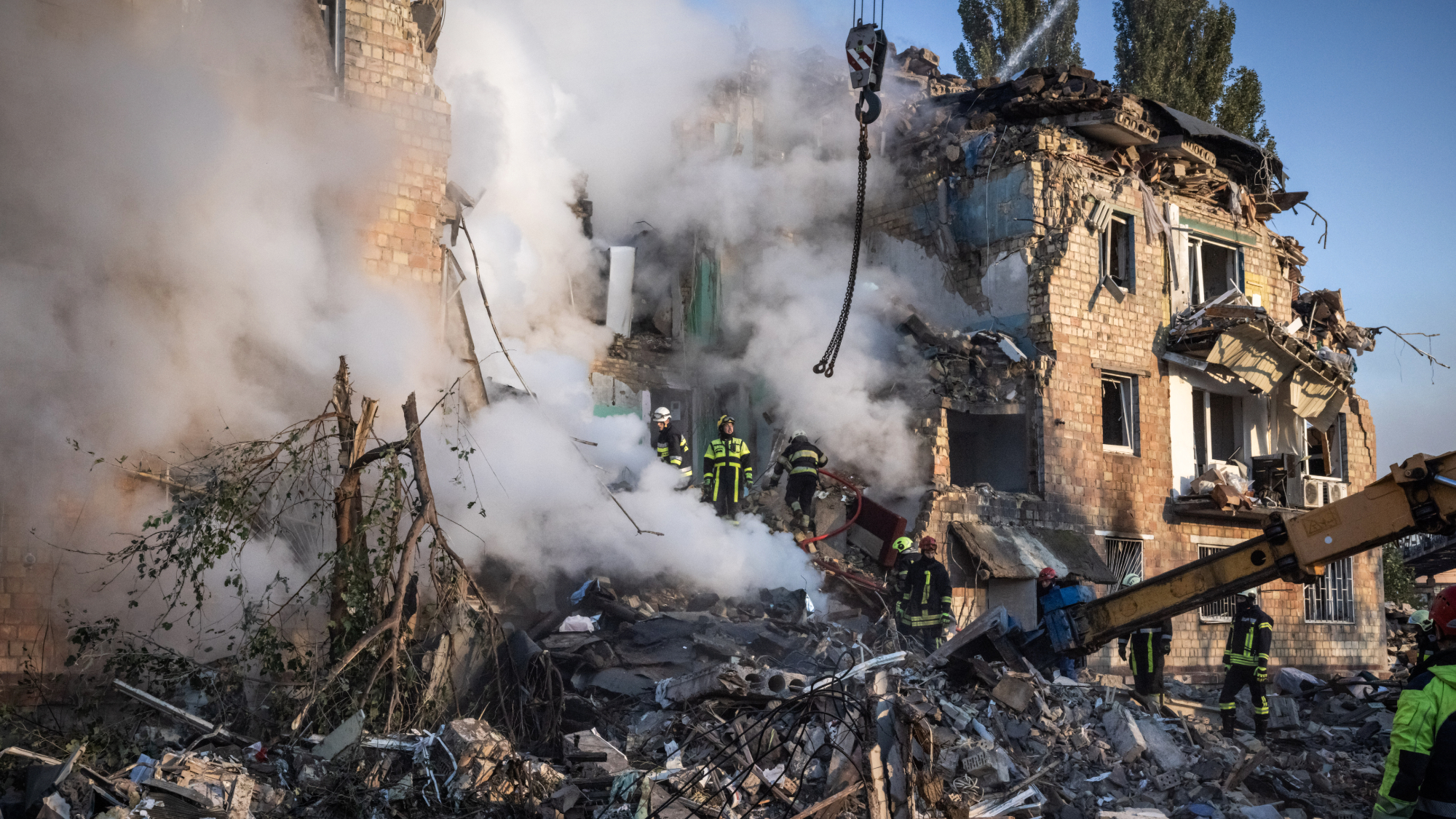Russian strike on Kyiv kills 23, hits EU offices
The strike was the second-largest since Russia invaded in 2022


A free daily email with the biggest news stories of the day – and the best features from TheWeek.com
You are now subscribed
Your newsletter sign-up was successful
What happened
Russia launched a massive attack on Ukraine Thursday, killing at least 23 people in Kyiv and damaging the European Union's diplomatic office and the nearby British Council office, along with scores of other civilian buildings.
Ukraine said it shot down most of the 598 attack drones and 31 missiles Russia fired across the country over 11 hours starting at about 3 a.m. But among the damage was a five-story residential building reduced to rubble. "As of 11 p.m. rescue efforts were still underway," Reuters said.
Who said what
Ukrainian President Volodymyr Zelenskyy said the strike, the second-largest since Russia invaded in 2022 and the deadliest since President Donald Trump hosted Russian President Vladimir Putin to jump-start peace talks, showed that Moscow is choosing "ballistics instead of the negotiating table." It was the "clearest signal" since the summit that Putin planned to "eschew Trump's peace efforts" while "also striking a blow to the Western institutions supporting Kyiv," The Wall Street Journal said.
Trump "was not particularly perturbed" by "Putin's overnight bombardment," Politico said. He "was not happy about this move, but he was also not surprised," White House press secretary Karoline Leavitt said, equating Russia's "attack on Kyiv," with Ukraine's recent "blow to Russia's oil refineries."
The Week
Escape your echo chamber. Get the facts behind the news, plus analysis from multiple perspectives.

Sign up for The Week's Free Newsletters
From our morning news briefing to a weekly Good News Newsletter, get the best of The Week delivered directly to your inbox.
From our morning news briefing to a weekly Good News Newsletter, get the best of The Week delivered directly to your inbox.
What next?
European Commission President Ursula von der Leyen said the EU was preparing a 19th sanctions package to force Putin "to the negotiating table," and vowed that European security guarantees would "turn Ukraine into a steel porcupine."
A free daily email with the biggest news stories of the day – and the best features from TheWeek.com
Peter has worked as a news and culture writer and editor at The Week since the site's launch in 2008. He covers politics, world affairs, religion and cultural currents. His journalism career began as a copy editor at a financial newswire and has included editorial positions at The New York Times Magazine, Facts on File, and Oregon State University.
-
 The EU’s war on fast fashion
The EU’s war on fast fashionIn the Spotlight Bloc launches investigation into Shein over sale of weapons and ‘childlike’ sex dolls, alongside efforts to tax e-commerce giants and combat textile waste
-
 How to Get to Heaven from Belfast: a ‘highly entertaining ride’
How to Get to Heaven from Belfast: a ‘highly entertaining ride’The Week Recommends Mystery-comedy from the creator of Derry Girls should be ‘your new binge-watch’
-
 The 8 best TV shows of the 1960s
The 8 best TV shows of the 1960sThe standout shows of this decade take viewers from outer space to the Wild West
-
 Putin’s shadow war
Putin’s shadow warFeature The Kremlin is waging a campaign of sabotage and subversion against Ukraine’s allies in the West
-
 Rubio boosts Orbán ahead of Hungary election
Rubio boosts Orbán ahead of Hungary electionSpeed Read Far-right nationalist Prime Minister Viktor Orbán is facing a tough re-election fight after many years in power
-
 Alexei Navalny and Russia’s history of poisonings
Alexei Navalny and Russia’s history of poisoningsThe Explainer ‘Precise’ and ‘deniable’, the Kremlin’s use of poison to silence critics has become a ’geopolitical signature flourish’
-
 Key Bangladesh election returns old guard to power
Key Bangladesh election returns old guard to powerSpeed Read The Bangladesh Nationalist Party claimed a decisive victory
-
 US, Russia restart military dialogue as treaty ends
US, Russia restart military dialogue as treaty endsSpeed Read New START was the last remaining nuclear arms treaty between the countries
-
 What happens now that the US-Russia nuclear treaty is expiring?
What happens now that the US-Russia nuclear treaty is expiring?TODAY’S BIG QUESTION Weapons experts worry that the end of the New START treaty marks the beginning of a 21st-century atomic arms race
-
 EU and India clinch trade pact amid US tariff war
EU and India clinch trade pact amid US tariff warSpeed Read The agreement will slash tariffs on most goods over the next decade
-
 Grok in the crosshairs as EU launches deepfake porn probe
Grok in the crosshairs as EU launches deepfake porn probeIN THE SPOTLIGHT The European Union has officially begun investigating Elon Musk’s proprietary AI, as regulators zero in on Grok’s porn problem and its impact continent-wide
